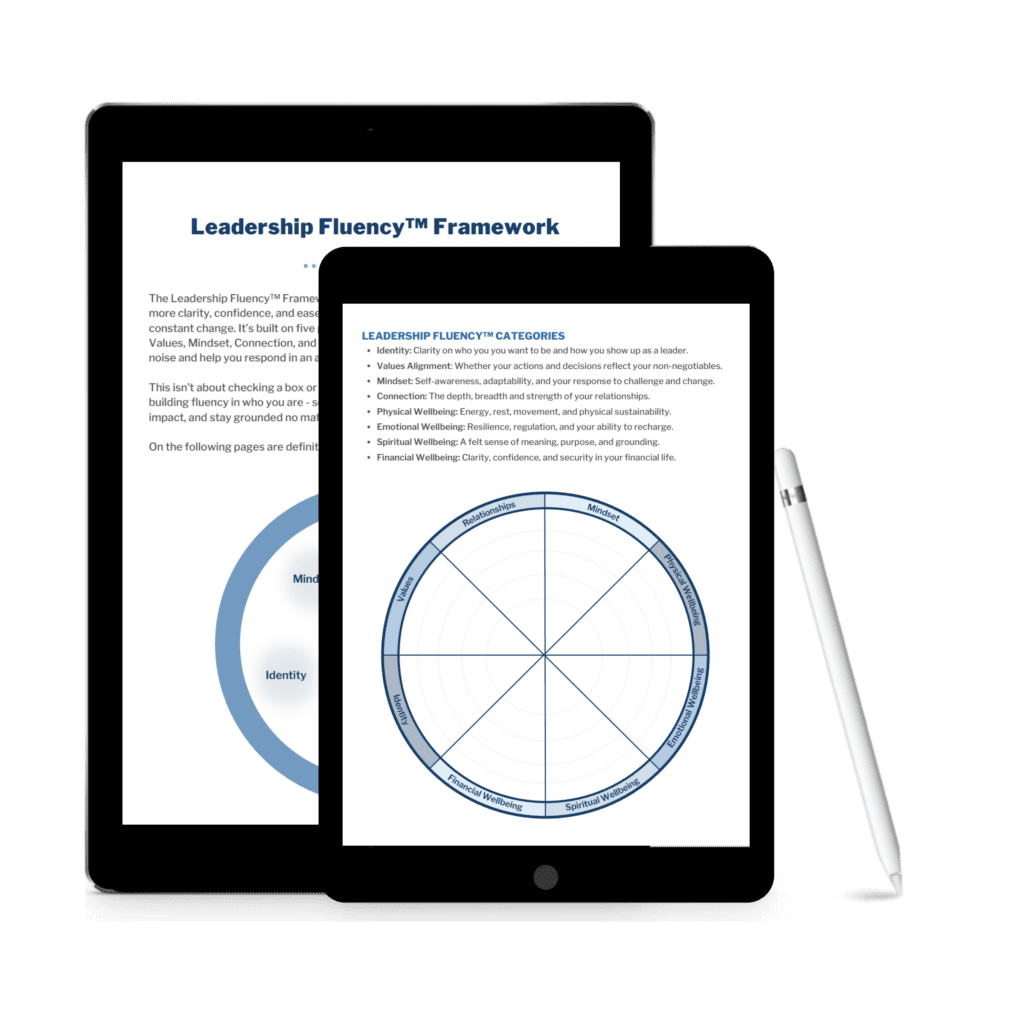To lead at the next level, know yourself at a deeper one.
Straight-shooting, no-BS coaching for
successful-but-overthinking senior leaders.
Overthinking Ends Now
You don’t need another leadership playbook. You need a break. (Or a nap!)
And maybe someone who’ll cut through the noise and tell you the truth.
Because success isn’t the problem. I’m betting you’ve already got the résumé, the title, and the wins to back it all up.
What’s missing is bandwidth and breathing room. The sense that you’re actually in control of your career instead of being dragged behind it.
Been there, done that, got a few T-shirts. On paper, everything looked great. Inside, I was dying a long, slow and painful death.
I didn’t have the tools when I needed them. And as it turns out, I was looking for support in all the wrong places. What I eventually figured out was if you want to level up, you need to look within and get aligned with you first.
That’s why I built Leadership Fluency™. And now I’m offering it to you. Not as another box to check, but as a way to help you stop second-guessing and overthinking, clear out the noise, and lead with clarity and ease.
Because last I checked, “exhausted and resentful” wasn’t in the job description. You don’t need to work harder. (In fact, you probably need to work less.)
You already have what it takes. My job is to help you see it, trust it, and use it.
Let’s do this!
To lead at the next level, know yourself at a deeper one.
Straight-shooting, no-BS coaching for
successful-but-overthinking senior leaders.
Overthinking Ends Now
You don’t need another leadership playbook. You need a break. (Or a nap!)
And maybe someone who’ll cut through the noise and tell you the truth.
Because success isn’t the problem. I’m betting you’ve already got the résumé, the title, and the wins to back it all up.
What’s missing is bandwidth and breathing room. The sense that you’re actually in control of your career instead of being dragged behind it.
Been there, done that, got a few T-shirts. On paper, everything looked great. Inside, I was dying a long, slow and painful death.
I didn’t have the tools when I needed them. And as it turns out, I was looking for support in all the wrong places. What I eventually figured out was if you want to level up, you need to look within and get aligned with you first.
That’s why I built Leadership Fluency™. And now I’m offering it to you. Not as another box to check, but as a way to help you stop second-guessing and overthinking, clear out the noise, and lead with clarity and ease.
Because last I checked, “exhausted and resentful” wasn’t in the job description. You don’t need to work harder. (In fact, you probably need to work less.)
You already have what it takes. My job is to help you see it, trust it, and use it.
Let’s do this!
Services Offered

1:1 Executive Coaching
Personalized coaching for high-achieving leaders ready to quiet the noise, trust their instincts, and lead with clarity and confidence.

Leadership Development
Strategic guidance and facilitated experiences that help teams communicate better, lead smarter, and work with more alignment.

Workshops and Signature Programs
Interactive, insight-rich sessions designed to spark self-awareness, strengthen leadership skills, and drive meaningful change.
Leadership Fluency™
Leadership Fluency™ helps you build the internal infrastructure that makes leading sustainable — not just another set of tactics to manage the chaos. It focuses on Identity, Values, Mindset, Connection, and Wellbeing.
Instead of chasing quick fixes or waiting for external validation, you develop clarity about who you are, what matters, and how to lead in a way that doesn’t cost you yourself.

How aligned is your leadership?
The Leadership Fluency™ Check-In provides a snapshot in time of where you’re at across the five pillars of Identity, Values, Mindset, Connection, and Wellbeing.
This isn’t about skill or performance. It’s about identifying, creating and sustaining a personal infrastructure that enables you to lead effectively regardless of what’s happening around you. (Re-org, anyone?)
This quick tool shows you where you’re grounded, where you’re stretched, and which areas might need some attention that will give you the strong foundation you need to lead.
You don’t need to prove yourself. You need to trust your instincts.
And imagine what it could look like to have more ease and fun in the process?
Instead of chasing quick fixes or waiting for external validation, you develop clarity about who you are, what matters, and how to lead in a way that doesn’t cost you yourself.

